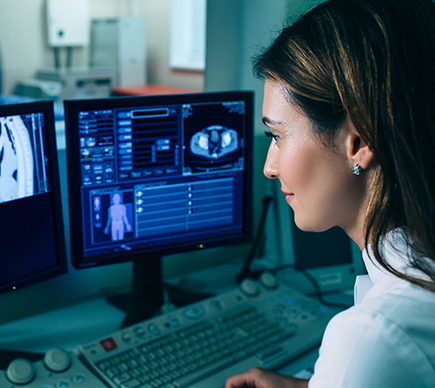CPD
5 weeks
Online - Part-time
16 CPD Credits
January 2027
About
Enhance your career by exploring the emerging area of Artificial Intelligence with the CPD Short Course in AI and Medical Imaging from RCSI Graduate School of Healthcare Management.
Artificial intelligence (AI) has enormous potential for use in medical imaging but brings new challenges such as avoidance of bias, impact on traditional staffing models, and how to capture and explain findings.
You'll consider the opportunities of AI and how it could be used to enhance patient care in medical imaging as well as how associated risks can be best mitigated in a clinical setting.
Learning is delivered through pre-recorded videos and engaging online activities. At the end of each week there will a 90-minute live webinar. All webinars are recorded and will be available to view at your convenience.
This five-week course is fully online and consists of four weeks of content and teaching. The fifth week is reserved for assessment.
Advance your understanding of AI and its application to medical imagery
Consider the potential to innovate
Critically discuss relevant ethical and legal considerations
Suitable for
This course will benefit healthcare professionals, such as radiologists, medical imaging technicians, healthcare administrators, and anyone interested in understanding the basic role and impact of artificial intelligence (AI) in medical imaging.
What you will learn
An introduction to the fundamentals of AI implications for medicine and society
Explore the key building blocks for AI in image analysis
Consider the application of AI in medical imaging
Discuss the ethics of AI and AI regulation in healthcare and medical imaging
Craft your individual action plan
Register your interest
Are you interested in learning more about this course? Register your interest below and a member of the team will be in touch with you.
Course information
This course will equip you with a comprehensive understanding of AI and medical imaging. By the end of the course participants will be better able to:
- Outline the concepts underpinning artificial intelligence in its analysis of medical images.
- Articulate the potential of artificial intelligence in healthcare and growing utilisation in medical imaging.
- Illustrate the ethical challenges and mitigation strategies in the use of artificial intelligence in healthcare.
- Appraise international approaches to the regulation of artificial intelligence for medical imaging.
- Examine responsibilities and key considerations of deploying artificial intelligence in medical imaging.
Technical induction: Friday, 16 January 2026.
Course start date: Monday, 19 January 2026.
Live webinars take place on between 2-3:30pm on:
Friday, 23 January 2026
Friday, 30 January 2026
Friday, 6 February 2026
Friday, 13 February 2026.
- Week 1: In week one, participants will delve into the introduction and fundamentals of AI, AI development in context, and the implications for medicine and society.
- Week 2: In week two, participants will explore the key building blocks for AI in image analysis, including big data, algorithms, layered filtering of image data, and the utilisation of convoluted neural networks.
- Week 3: In week three, participants will engage with the application of AI in medical imaging, covering its development and growth, how AI is applied in this context, and exploring examples of use along with their implications.
- Week 4: In week four, participants will immerse themselves in discussions surrounding the ethics of AI, AI regulation in healthcare & medical imaging, reflections on ethics regulation, oversight, safety, clinical governance of AI, stakeholder liabilities, care delivery, and the international context.
- Week 5: In the final week, you will reflect on your learning and develop a personal action plan, focusing on actionable and applicable changes tailored to your specific workplace and context
We understand that some people may be new to online learning. Our virtual learning environment (VLE) is designed to be intuitive, accessible and easy to navigate. A dedicated course coordinator will be available to you, should you experience any technical difficulties, or have any specific questions relating to learning online. At the start of each course, there will be some short videos to orientate you to the platform and course format.
Assessment is continuous. Achieving the RCSI Completion Certificate and earning continuous professional development (CPD) points involves passing weekly MCQs, engaging in online discussions, and participating in reflective exercises, including the completion of a personal action plan.
Although this course does not carry credits as per the European Credit Transfer System, it upholds rigorous quality assurance standards to provide an excellent educational experience. The course has been approved by the RCSI Professional Development and Practice Committee and is accredited for CPD points in line with the Irish Medical Council guidelines.
Participants seeking recognition in other jurisdictions should verify the applicability of these CPD points as per their local requirements.
Admissions
There are no entry requirements, and no formal application review is needed. Once your application is submitted and your fee has been paid successfully, your seat will be confirmed on your course.
The price for this course is €975.
Note: RCSI accepts no obligation to refund any fee, or part thereof, in respect of a participant who chooses to withdraw from or does not complete a course.


